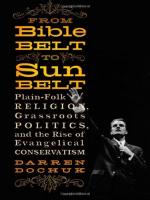|
This section contains 3,821 words (approx. 13 pages at 300 words per page) |

|
Religious traditions are, by their very nature, complex. One the one hand, the symbolize the highest aspirations of the human mind and spirit; on the other, they sanctify and give meaning to the most ordinary and commonplace human needs and activities. The complexity of religion and its functions have been analyzed in various ways. There has been a tendency, however, to distinguish between those aspects created by and appropriate to the educated elites, for example, priests and rules, and those that help the uneducated, common folk cope with the uncertainities and exigencies of life. Scholars have sometimes referred to this distinction as obtaining between "great" and "little" traditions or between "elite" and "folk" traditions. It must be kept in mind that these formal distinctions do justice neither to the multiplexity of religious traditions nor to the organic unity that characterizes them, even though such categories may...
|
This section contains 3,821 words (approx. 13 pages at 300 words per page) |

|




